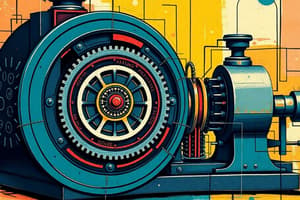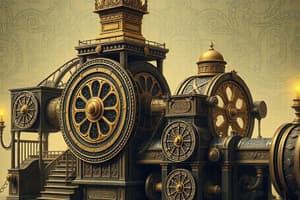Podcast
Questions and Answers
Who is credited with the invention of the first working telephone?
Who is credited with the invention of the first working telephone?
- John Atanasoff
- Samuel Morse
- Charles Babbage
- Alexander Graham Bell (correct)
What was the primary purpose of the difference engine invented by Charles Babbage?
What was the primary purpose of the difference engine invented by Charles Babbage?
- To perform mathematical calculations (correct)
- To print documents automatically
- To communicate over long distances
- To transmit electromagnetic waves
What is the significance of the ABC computer developed in 1942?
What is the significance of the ABC computer developed in 1942?
- It combined telephone and telegraph technologies.
- It was the first computer with a built-in printer.
- It was the first all-electronic computer. (correct)
- It was the first mechanical calculator.
Which invention paved the way for the development of mechanical calculators?
Which invention paved the way for the development of mechanical calculators?
In what year was Morse Code conceived, marking an important development in the Electromechanical Age?
In what year was Morse Code conceived, marking an important development in the Electromechanical Age?
What innovation is attributed to Johann Gutenberg in 1450?
What innovation is attributed to Johann Gutenberg in 1450?
Who is known for inventing the first mechanical calculator in 1623?
Who is known for inventing the first mechanical calculator in 1623?
What type of numbering system was created by Hindus in India between 100 and 200 A.D.?
What type of numbering system was created by Hindus in India between 100 and 200 A.D.?
Which calculator could perform addition and subtraction and was invented by Blaise Pascal?
Which calculator could perform addition and subtraction and was invented by Blaise Pascal?
What was a significant contribution of the Greeks around 600 B.C. to the storage of information?
What was a significant contribution of the Greeks around 600 B.C. to the storage of information?
Which mechanical device is considered one of the first information processors?
Which mechanical device is considered one of the first information processors?
What notable functionality did Wilhelm Schickard's mechanical calculator have?
What notable functionality did Wilhelm Schickard's mechanical calculator have?
Which major advancement occurred in printing technology with the arrival of Gutenberg's invention?
Which major advancement occurred in printing technology with the arrival of Gutenberg's invention?
What is the defining communication method of the pre-mechanical age?
What is the defining communication method of the pre-mechanical age?
Which input technology was used by the Sumerians during the pre-mechanical age?
Which input technology was used by the Sumerians during the pre-mechanical age?
Which of the following ages succeeded the pre-mechanical age?
Which of the following ages succeeded the pre-mechanical age?
What significant development characterized the mechanical age?
What significant development characterized the mechanical age?
During which age did inventions like the telegraph and telephone emerge?
During which age did inventions like the telegraph and telephone emerge?
What is a key feature of the electronic age?
What is a key feature of the electronic age?
What was a common misconception about the pre-mechanical age?
What was a common misconception about the pre-mechanical age?
How did the evolution from the mechanical age to the electronic age impact technology?
How did the evolution from the mechanical age to the electronic age impact technology?
Flashcards are hidden until you start studying
Study Notes
Babbage’s Engines
- Charles Babbage invented the difference engine and the analytical engine, earning the title "Father of Modern Computer."
Electromechanical Age
- Morse Code (1835): Samuel Morse developed the first version of the electromagnetic telegraph.
- Telephone and Radio (1876): Alexander Graham Bell created the first working telephone.
- Comptograph (1885): Dorr Felt invented the first adding and subtracting calculator, which included a built-in printer.
Electronic Age
- ABC Computer (1942): John Atanasoff and Clifford Berry completed the first all-electronic computer known as the Atanasoff-Berry Computer, foundational for electronic digital computers.
Historical Development of Information Storage
- Books and Libraries: Beginning around 600 B.C., the Greeks folded papyrus sheets into leaves and bound them, marking early permanent storage devices.
- First Numbering Systems: Between 100 and 200 A.D., Hindus in India created a nine-digit numbering system that resembles modern numbering systems.
- First Calculators: The abacus is recognized as one of the earliest information processing devices.
Mechanical Age
- First Information Explosion (1450): Johann Gutenberg invented the movable metal-type printing process, revolutionizing information dissemination.
- Calculating Machine (1623): Wilhelm Schickard developed the first mechanical calculator capable of handling six digits.
- Pascaline: Invented by Blaise Pascal, this device could perform addition and subtraction, showcasing early machine-based calculations.
Overview of Information Technology History
- Pre-mechanical Age: Spanning from 3000 B.C. to 1450 A.D., marked by the advent of writing and alphabets.
- Communication: Early humans communicated through spoken language and pictograms.
- Input Technologies: The Sumerians utilized a stylus to make marks in wet clay, representing early input technology.
Studying That Suits You
Use AI to generate personalized quizzes and flashcards to suit your learning preferences.




